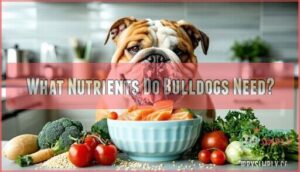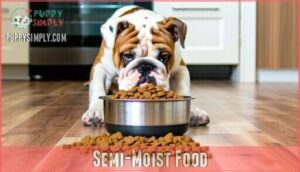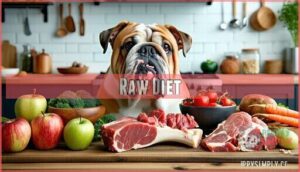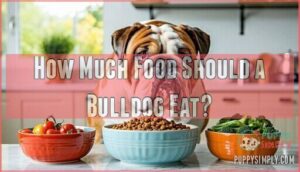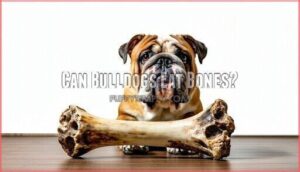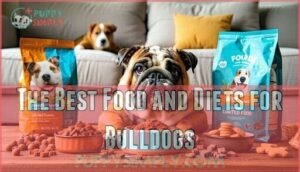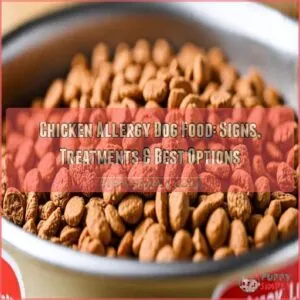This site is supported by our readers. We may earn a commission, at no cost to you, if you purchase through links.
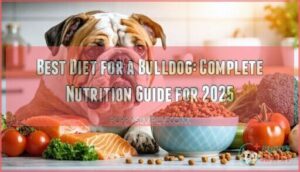 The best diet for a bulldog centers on high-quality protein sources like chicken, fish, or lamb, paired with easily digestible carbohydrates and healthy fats.
The best diet for a bulldog centers on high-quality protein sources like chicken, fish, or lamb, paired with easily digestible carbohydrates and healthy fats.
You’ll want to choose foods specifically formulated for medium breeds, as bulldogs need controlled portions to prevent weight gain that can worsen their breathing issues.
Look for kibble with smaller pieces that won’t challenge their flat faces, and avoid common allergens like corn or soy.
Feed measured portions twice daily rather than free-feeding, since bulldogs are notorious for overeating.
Your wrinkled companion’s unique anatomy means their nutritional needs differ substantially from other breeds, and understanding these specific requirements can transform their health and happiness.
Table Of Contents
- Key Takeaways
- Bulldog Nutritional Needs
- What Nutrients Do Bulldogs Need?
- Best Food Options for Bulldogs
- What Foods Can Bulldogs Eat?
- What Foods Can Bulldogs Not Eat?
- How Much Food Should a Bulldog Eat?
- How Often Should I Feed My Bulldog Puppy?
- Can Bulldogs Eat Bones?
- How Much Water Should a Bulldog Drink?
- The Best Food and Diets for Bulldogs
- Frequently Asked Questions (FAQs)
- Are there any special considerations for feeding a bulldog?
- What is the difference between dry and wet food for a bulldog?
- What are the benefits of joining bulldog communities online?
- Are there any risks associated with raw diets for bulldogs?
- What should I look for when choosing a quality dog food?
- Do bulldogs need special supplements for joint health?
- Can bulldogs eat human food as treats safely?
- How do I transition my bulldog to new food?
- What causes excessive gas in bulldogs during eating?
- Conclusion
Key Takeaways
- You’ll need to focus on high-quality protein sources like chicken or fish (18-23% protein) and choose smaller kibble pieces that won’t challenge your bulldog’s flat face structure.
- You should feed measured portions twice daily instead of free-feeding since bulldogs are notorious overeaters, and their weight gain can worsen breathing problems due to their unique anatomy.
- You’ll want to avoid common allergens like corn and soy while selecting AAFCO-approved foods specifically formulated for medium breeds to support their joint health and prevent obesity.
- You shouldn’t give your bulldog cooked bones, chocolate, grapes, onions, or garlic, but you can safely offer treats like plain chicken, carrots, and sweet potatoes as supplements to their regular diet.
Bulldog Nutritional Needs
Your bulldog’s nutritional foundation requires careful balance to support their unique build.
Adult bulldogs need 18% protein from quality sources like chicken or fish, while puppies require 22% for proper growth.
Quality protein builds strong bulldogs—choose chicken or fish for optimal muscle development and lifelong health.
Fat intake should include omega fatty acids for skin health, comprising 8-15% of their diet.
Carb choices matter—opt for whole grains over fillers like corn.
Joint support becomes essential given their predisposition to hip issues.
Understanding these bulldog dietary needs helps prevent obesity and supports their muscular frame throughout life.
What Nutrients Do Bulldogs Need?
Your bulldog’s nutritional foundation rests on five essential building blocks that work together like pieces of a puzzle.
Understanding bulldog dietary needs helps you make informed choices about protein, fats, and other necessary nutrients.
Your bulldog nutrition plan should include:
- High-quality protein sources – chicken, beef, or fish comprising 23% of their diet
- Essential fats – omega-3 and omega-6 fatty acids for skin and coat health
- Complex carbohydrates – whole grains providing sustained energy without excess weight gain
- Vitamin and mineral balance – supporting immune function and overall wellness
This bulldog diet approach guarantees superior health.
Best Food Options for Bulldogs
You’ll find several food types that work well for your bulldog’s unique nutritional needs, including dry kibble, wet canned food, semi-moist options, home-prepared meals, and raw diets.
Finding the perfect food for your bulldog means exploring options that match their unique needs and lifestyle.
Each option offers specific benefits and drawbacks, so understanding these differences helps you choose the right feeding approach for your dog’s health, age, and lifestyle.
Dry Food
Now that you understand your bulldog’s nutritional needs, let’s explore dry food options.
Kibble offers convenience and dental benefits through its crunchy texture.
Choose brands with high-quality ingredients and appropriate kibble size for your bulldog’s flat face.
A bulldog’s diet should prioritize natural protein sources for ideal health.
Proper storage prevents spoilage, though dry food requires attention to hydration concerns since it lacks moisture content.
| Dry Food Benefits | Considerations |
|---|---|
| Convenient storage and serving | Requires additional water intake |
| Promotes dental health through chewing | Must match kibble size to breed |
| Cost-effective compared to alternatives | Ingredient quality varies by brand |
Canned Wet Food
Many pet parents find canned wet food strikes the perfect balance between nutrition and convenience for their bulldog’s daily meals.
This option delivers superior palatability factors that even the pickiest eaters can’t resist, while providing essential moisture content your bulldog needs.
Key wet food benefits for your bulldog:
- Higher protein content – Most quality canned options contain 8-12% more protein than dry kibble
- Enhanced hydration – The 75% moisture content supports kidney function and prevents dehydration
- Better digestibility – Softer texture reduces strain on your bulldog’s digestive system
When selecting the best bulldog food in canned form, prioritize ingredient quality over flashy marketing.
Look for real meat as the first ingredient and avoid fillers like corn or wheat.
You can even find a wide variety online.
Storage solutions become vital once opened – refrigerate unused portions and use within three days.
While cost comparison shows wet food runs higher per serving than dry options, the bulldog nutrition benefits often justify the investment for ideal bulldog diet management.
Semi-Moist Food
Semi-moist dog food strikes the perfect balance between wet and dry options for your bulldog’s diet.
This texture preference appeals to picky eaters while offering superior palatability factors compared to kibble.
Modern preservation methods maintain ingredient quality without excessive additives.
However, consider dental implications since softer textures won’t scrape teeth clean like harder kibble does for ideal bulldog nutrition, and this is a key factor in choosing the right food, with superior quality being essential.
Home Produced Diet
Cooking for your bulldog at home puts you in the driver’s seat of their nutrition. Recipe formulation requires balancing proteins, carbohydrates, and fats while ensuring proper vitamin and mineral content.
Ingredient sourcing becomes your responsibility—choose high-quality meats, vegetables, and grains. Diet safety means thoroughly cooking all ingredients and avoiding toxic foods like onions or chocolate.
Time commitment includes meal prep, cooking, and storage planning. Cost analysis often shows homemade dog food costs more than commercial options.
Dog food preparation demands consistent portioning, while proper dog food safety prevents contamination and spoilage. It’s vital to keep your vet’s advice in mind for balanced dietary needs when creating a homemade diet with proper vitamin and mineral content, considering diet safety, and ensuring consistent portioning.
Raw Diet
Raw diets offer bulldogs closest-to-nature nutrition but require careful consideration of both benefits and risks.
These unprocessed meals can improve your bulldog’s coat shine and reduce digestive issues, yet they also expose your pet to harmful bacteria that cooked foods eliminate.
Raw bulldog diet enthusiasts report fewer dog food allergies and better bulldog digestive health. However, the high fat content increases pancreatitis risk, while improper bone content safety protocols can cause serious injuries.
You’ll need to balance organ meat ratios carefully to avoid nutritional imbalances.
Consider these essential factors:
- Raw Diet Benefits include higher antioxidants and improved dental hygiene
- Raw Diet Risks involve bacterial contamination and potential nutrient gaps
- Strict food handling prevents cross-contamination with human food
- Supplementing Raw Diet may be necessary for complete nutrition
- Premade raw dog food offers safer alternatives than homemade versions
Always consult your veterinarian before switching to address specific bulldog health issues.
What Foods Can Bulldogs Eat?
Your bulldog can enjoy safe human foods like lean chicken, salmon, sweet potatoes, and plain rice.
These provide excellent nutrition when added to their regular bulldog diet. Fresh vegetables such as carrots and green beans make healthy treats.
Consider breed-specific diets that address common bulldog food allergies. Always check dog food ingredients for quality protein sources.
Dietary supplements like omega-3 fatty acids support skin health. Dogsafe foods should complement balanced dog nutrition rather than replace commercial food designed for your bulldog’s specific needs. Ensure to prioritize balanced dog nutrition for optimal health.
What Foods Can Bulldogs Not Eat?
Protecting your bulldog from toxic foods requires vigilance and knowledge. Chocolate and caffeine products cause severe poisoning, while grapes and raisins can trigger sudden kidney failure. Onions and garlic damage red blood cells, leading to dangerous anemia in your pet.
Toxic ingredients like xylitol, found in sugar-free gum, cause rapid blood sugar drops. Avocados contain persin, which affects your bulldog’s heart and lungs. Macadamia nuts rank among the most dangerous foods for dogs, causing weakness and tremors.
Harmful additives in processed foods pose additional risks. Excessive salt leads to sodium poisoning, while artificial preservatives may trigger food allergies. Cherry pits and apple seeds present choking hazards and contain trace cyanide.
Raw bread dough creates dangerous fermentation in your dog’s stomach. Coconut oil and citrus fruits often cause digestive irritants, resulting in stomach upset.
Always contact your veterinarian immediately if your bulldog consumes any toxic foods. Document what they ate and when for proper treatment guidance.
How Much Food Should a Bulldog Eat?
After understanding which foods to avoid, determining proper portion sizes becomes your next priority. Adult bulldogs need 35 calories per pound of body weight daily, making portion control essential for their health.
Here’s your bulldog feeding guide for ideal weight management:
- Calculate daily portions: Measure 1 cup of dry food per 25 pounds of body weight
- Consider activity levels: Active dogs require 10-15% more calories than sedentary bulldogs
- Monitor age factors: Senior bulldogs need fewer calories due to slower metabolism
Split daily portions into two meals for better digestion and feeding schedule consistency. Some owners opt for a raw food diet to guarantee complete control over ingredients.
How Often Should I Feed My Bulldog Puppy?
After determining the right amount of food, establishing proper puppy feeding frequency becomes your next priority.
Your bulldog puppy’s growth stage meals require careful timing to support healthy development while avoiding overfeeding risks.
A structured bulldog feeding schedule works best:
- 6-12 weeks: Feed 4 meals daily with high-quality bulldog puppy food
- 12-24 weeks: Reduce to 3 meals as your puppy grows
- 6+ months: Switch to 2 meals per day following your feeding guide
- Consistent timing: Feed at the same hours daily for digestive health
- Fresh water: Always provide clean water between scheduled feeding benefits sessions
This weaning schedule supports ideal puppy nutrition.
Can Bulldogs Eat Bones?
You might wonder if it’s safe to give your bulldog bones as treats or supplements to their regular diet.
While bones can provide dental benefits and mental stimulation, bulldogs face unique risks due to their flat faces and strong jaws, which require careful consideration of bone type, size, and preparation methods, including the potential for unique risks.
The Don’ts of Giving Your Bulldog a Bone
Never give your bulldog cooked bones from any source. These dangerous treats turn into sharp weapons inside your dog’s mouth and stomach.
Cooked bones splinter easily, creating choking hazards and digestive blockages that require emergency surgery. Small bones pose the greatest threat, regardless of whether they’re raw or cooked.
Your bulldog can easily swallow these whole, leading to serious dog health issues. Poultry bones are particularly risky because they break into needle-sharp fragments.
Bacterial contamination is another serious concern with bones. Raw bones can harbor harmful bacteria like salmonella, affecting your dog’s digestive health and your family’s safety.
It’s also important to bear in mind the dental health benefits when choosing appropriate chew toys. Don’t risk dental damage from overly hard bones either.
Always seek veterinary advice before introducing any new dog treats, especially bones, to prevent costly health complications.
The Do’s of Giving Your Bulldog a Bone
Several key guidelines will help you safely provide bones to your bulldog. Raw bones offer dental benefits and safe chewing opportunities when chosen correctly. Bone size matters most – select bones larger than your bulldog’s muzzle to prevent choking hazards. Raw marrow bones and knuckle bones work well, but avoid small chicken bones that splinter easily.
Supervision needed during all bone sessions prevents accidents and gastrointestrial upset. Watch for aggressive chewing that might damage teeth or create dangerous fragments. Remove bones when they become small enough to swallow whole.
Here’s what responsible bone feeding looks like:
- Choose fresh, raw bones from reputable sources to minimize bacterial contamination
- Limit sessions to 15-20 minutes to prevent overconsumption and digestive problems
- Refrigerate unused portions immediately to maintain freshness and safety
Consider veterinary advice for your specific bulldog’s needs, especially regarding bulldog digestive health. These dog treats complement regular nutrition when used properly.
How Much Water Should a Bulldog Drink?
Your bulldog’s daily water intake should equal one ounce per pound of body weight.
A 50-pound bulldog needs roughly 50 ounces of water daily.
Activity level impact substantially affects these requirements—active dogs need more hydration than couch potatoes.
Here are five hydration monitoring tips for ideal bulldog hydration:
- Check water bowl refill frequency – Monitor how often you’re adding fresh water
- Watch for dehydration signs – Dry gums, lethargy, and excessive panting signal trouble
- Choose stainless steel water bowl types – They’re easier to clean and bacteria-resistant
- Track drinking patterns – Note changes in your dog’s normal consumption habits
- Provide multiple water stations – Place bowls throughout your home for easy access
The Best Food and Diets for Bulldogs
Now that you understand proper hydration, let’s explore the best bulldog diet options available.
Choose AAFCO-approved dog food with breed-specific formulas designed for your bulldog’s unique needs.
Look for limited ingredient recipes if your pet has food allergies or bulldog skin allergies.
High-quality bulldog food brands offer life stage nutrition, while supplements support bulldog joint health.
Consider your dog’s age, activity level, and health conditions when selecting between dry kibble, wet food, or specialized diets recommended by veterinarians.
Some owners find grain-free options helpful for sensitive digestion.
Frequently Asked Questions (FAQs)
Are there any special considerations for feeding a bulldog?
You’ll need to manage portion sizes carefully since bulldogs gain weight easily. Their flat faces make eating harder, so choose smaller kibble. Watch for food allergies and consider joint-supporting supplements.
What is the difference between dry and wet food for a bulldog?
Ever wondered which bowl wins the mealtime battle?
Dry kibble supports your bulldog’s dental health and offers convenience, while wet food provides better hydration and easier digestion for their sensitive stomachs.
What are the benefits of joining bulldog communities online?
Joining bulldog communities online connects you with experienced owners who share breed-specific advice, health tips, and emotional support.
You’ll access valuable resources, troubleshoot problems faster, and build lasting friendships with fellow bulldog enthusiasts who provide emotional support.
Are there any risks associated with raw diets for bulldogs?
Raw feeding sounds appealing, but you’re walking into potential hazards.
Bacterial contamination, nutritional imbalances, and choking risks lurk beneath the surface.
Your bulldog’s sensitive digestive system might struggle with uncooked proteins, causing serious health complications.
What should I look for when choosing a quality dog food?
Look for high-quality protein as the first ingredient, avoid fillers like corn or soy, check for AAFCO approval, and choose brands with whole foods rather than by-products or artificial preservatives.
Do bulldogs need special supplements for joint health?
Yes, bulldogs typically need joint supplements like glucosamine and chondroitin due to their breed’s predisposition to hip dysplasia and joint problems.
These supplements help maintain cartilage health and improve mobility, especially for overweight or senior bulldogs who may benefit from chondroitin.
Can bulldogs eat human food as treats safely?
About 90% of human foods are toxic to dogs.
You can safely share plain cooked chicken, carrots, and blueberries with your bulldog.
Avoid chocolate, grapes, onions, and garlic—they’re dangerous for your pup’s health.
How do I transition my bulldog to new food?
Gradually switch your bulldog to new food over seven days.
Mix 25% new food with 75% old food for two days, then 50-50, then 75% new with 25% old,
finally switching completely to prevent digestive upset.
What causes excessive gas in bulldogs during eating?
Your bulldog’s excessive gas during eating typically stems from swallowing air while gobbling food too quickly.
Eating too fast, low-quality ingredients, and food sensitivities create digestive upset that leads to uncomfortable flatulence, which is often a result of excessive gas.
Conclusion
Ironically, while bulldogs appear sturdy and resilient, they’re actually among the most nutritionally sensitive breeds requiring careful dietary management.
The best diet for a bulldog isn’t complicated—it simply demands attention to portion control, high-quality ingredients, and breed-specific needs.
You’ll find success by choosing appropriate kibble size, avoiding common allergens, and maintaining consistent feeding schedules.
Remember, your bulldog’s flat face and compact build make proper nutrition essential for preventing obesity and respiratory complications that could compromise their quality of life.
- https://americannaturalpremium.com/breed-guide/best-dog-food-for-bulldog-a-comprehensive-nutritional-guide/
- https://petcityhouston.com/2025/01/25/best-dog-food-for-english-bulldogs-a-guide-to-healthy-choices/
- https://www.prodograw.com/raw-feeding-guide/bulldog-feeding-guide/
- https://citizenshipper.com/blog/best-dog-food-for-bulldogs-top-nutrition-guide/
- https://www.medivetgroup.com/pet-care/pet-advice/your-complete-guide-to-dog-nutrition/

